
Aerial view of the infamous Río Huaypetue gold mine in the Peruvian Amazon. This remote but massive gold mine is known for the destruction of primary rainforest, widespread mercury pollution, and child and slave labor. Photo by: Rhett A. Butler.
Scientists warn that the Earth may be reaching a planetary tipping point due to a unsustainable human pressures, while the UN releases a new report that finds global society has made significant progress on only four environmental issues out of ninety in the last twenty years. Climate change, overpopulation, overconsumption, and ecosystem destruction could lead to a tipping point that causes planetary collapse, according to a new paper in Nature by 22 scientists. The collapse may lead to a new planetary state that scientists say will be far harsher for human well-being, let alone survival.
“The odds are very high that the next global state change will be extremely disruptive to our civilizations. Remember, we went from being hunter-gathers to being moon-walkers during one of the most stable and benign periods in all of Earth’s history,” co-author Arne Mooers with Simon Fraser University explains in a press release.
If it all sounds apocalyptic, the scientists say it probably should.
“In a nutshell, humans have not done anything really important to stave off the worst because the social structures for doing something just aren’t there,” says Mooers. “My colleagues who study climate-induced changes through the earth’s history are more than pretty worried. In fact, some are terrified.”
A new bleaker world?
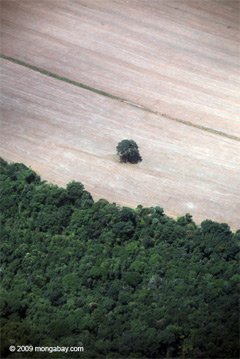
Much like a single ecosystem can collapse if overexploited or degraded for too long, the scientists argue that the global environment could also reach a tipping point, leading to a whole new world. While planetary states have changed throughout Earth’s history—such as the mass extinction of the dinosaurs and the rise of the mammals—this would be the first global shift caused by a single species. The 22 authors—including ecologists, biologists, complex-systems theoreticians, geologists and paleontologists—examined how human pressures are modifying our atmosphere, oceans, land, and climate to an extent in which current ecological states could collapse, impoverishing the world.
“The data suggests that there will be a reduction in biodiversity and severe impacts on much of what we depend on to sustain our quality of life, including, for example, fisheries, agriculture, forest products and clean water. This could happen within just a few generations,” says lead author Anthony Barnosky, with the University of California, Berkeley. Some species would likely come out as winners in this scenario, but overall biodiversity would crash with drastic impacts for human society.
Research on ecological collapse has shown that once 50-90 percent of an ecosystem is altered, it risks imminent collapse. Extrapolating this to the world as a whole, the researchers point out that today 43 percent of the world’s terrestrial ecosystems have been converted to agriculture or urban use with roads covering most wild areas. Experts say that by 2025, half of the world’s land surface will have been altered. Even untouched areas, however, are feeling the impacts of climate change, biodiversity loss, and pollution.
“Can it really happen? Looking into the past tells us unequivocally that, yes, it can really happen. It has happened,” Barnosky says. “I think that if we want to avoid the most unpleasant surprises, we want to stay away from that 50 percent mark.”
The scientists also compared today’s environmental pressures to past tipping points that led to wholesale planetary changes.
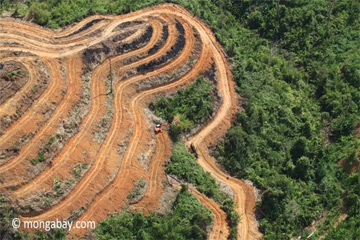
“The last tipping point in Earth’s history occurred about 12,000 years ago when the planet went from being in the age of glaciers, which previously lasted 100,000 years, to being in its current interglacial state,” explains Mooers. “Once that tipping point was reached, the most extreme biological changes leading to our current state occurred within only 1,000 years. That’s like going from a baby to an adult state in less than a year.”
However, he adds: “The planet is changing even faster now.”
Co-author Elizabeth Hadly says that tipping points may have already occurred in some regions, leading to a ruined environment, worsening conflict, and human misery.
“I just returned from a trip to the high Himalayas in Nepal, where I witnessed families fighting each other with machetes for wood—wood that they would burn to cook their food in one evening. In places where governments are lacking basic infrastructure, people fend for themselves, and biodiversity suffers,” she says. “We desperately need global leadership for planet Earth.”
Little progress
Global leadership will be attempted in a few week at the UN’s Rio+20 Summit on Sustainability, which marks twenty years since a landmark environmental agreement was signed at Rio in 1992. But a new report by the UN Environment Program (UNEP) finds that in the last twenty years the world has made little significant progress on its ambitious environmental goals.
“If current patterns of production and consumption of natural resources prevail and cannot be reversed and ‘decoupled,’ then governments will preside over unprecedented levels of damage and degradation,” said UNEP Executive Director Achim Steiner in a statement.
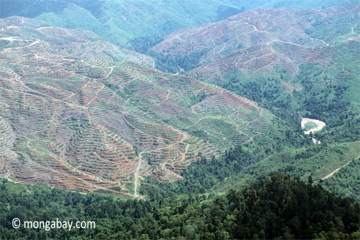
The report, entitled the Global Environment Outlook, is the fifth to be released by the UNEP and the bleakest. While the world has made good progress on four goals—eliminating ozone harming products, removing lead from fuel, increasing access to improve water supplies, and research on reducing marine pollution—it has not tackled 86 others.
On the plus side, forty of the goals have seen some progress, including the establishment of protected areas on land, which currently cover 12 percent of the world’s land, and slowing the rate of deforestation. Although forests continue to fall worldwide for commodities and consumer products, nations like Brazil have achieved significant declines in deforestation. The report also finds some progress in fighting global hunger with the rate of people suffering from malnourishment decreasing even though the total number is on the rise.
Little to no progress was made on 24 of the environmental goals, including what many scientists say is the gravest threat to the environment (and humanity) today: climate change. Other goals in this category include increasing food production, combating desertification, saving endangered species, improving efficiency of resource use, and recognizing ecosystem services in the economy.
Declines were actually measured in eight of the goals, including on the health of coral reefs and wetlands, as well as in the consumption of freshwater.
The remaining fourteen goals, such as protecting freshwater ecosystems, lacked enough data to make a conclusion.
“The moment has come to put away the paralysis of indecision, acknowledge the facts and face up to the common humanity that unites all peoples,” Steiner said. “Rio+20 is a moment to turn sustainable development from aspiration and patchy implementation into a genuine path to progress and prosperity for this and the next generations to come.”
Fiddling while Rio burns
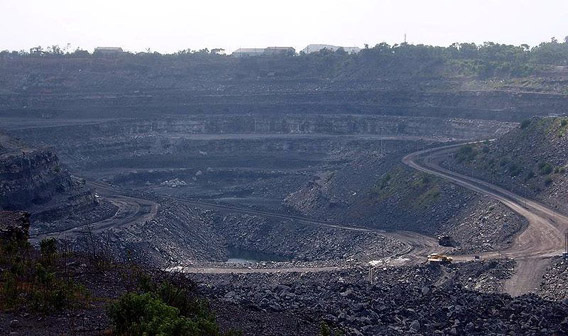
Surface coal mining in Bihar, India. Around 40 percent of India’s power is currently provided by coal, the most carbon intensive fuel source.
But observers do not expect much from Rio+20, at least not from world leaders and governments. Nations are working on a draft document called “The Future We Want” to be agreed upon at the summit, but the document is merely a pledge without any binding actions. Still, government negotiations over the document’s wording have been fierce and persnickety according to observers, with the World Wide Fund for Wildlife (WWF) warning this week that negotiations over the already watered-down agreement could well “collapse.”
Greenpeace reports that developing nations are stripping the document of any references to “accountability,” making even calls for transparency difficult, meanwhile the U.S. has come out opposing the major reference for nations to deal with “unsustainable consumption and production patterns” and is cutting any reference to “equity.”
The summit has already dropped any focus on global environmental crises like climate change and deforestation, but some are holding out hope that it will result in better marine protections and greater strength for the UNEP. Observers also say that the thousands of attending NGOs, businesses, and experts may help move the world forward, while governments stall. Several of the world’s top leaders have opted out of attending the summit, among them U.S. President Barack Obama, UK Prime Minister David Camera, and German Chancellor Angela Merkel.
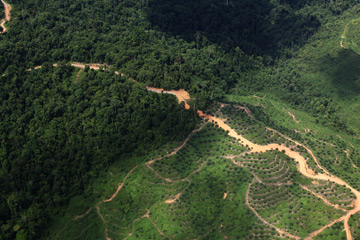
Solutions to the world’s ongoing global environmental crisis are not mysterious. Scientists and experts urge a rapid transition from fossil fuels to renewable energy, ending harmful subsidies, conservation of global biodiversity, protection of standing forests, an overhaul of fisheries and ocean management, increasing energy efficiency and access, transforming agricultural systems, changing measurements of national success to focus on human well-being over GDP, and combating overpopulation through education and contraceptive access.
“My view is that humanity is at a crossroads now, where we have to make an active choice,” integrative biologist Anthony Barnosky says. “One choice is to acknowledge these issues and potential consequences and try to guide the future (in a way we want to). The other choice is just to throw up our hands and say, ‘Let’s just go on as usual and see what happens.’ My guess is, if we take that latter choice, yes, humanity is going to survive, but we are going to see some effects that will seriously degrade the quality of life for our children and grandchildren.”
Related articles
Consumption, population, and declining Earth: wake-up call for Rio+20

(05/15/2012) Currently, human society is consuming natural resources as if there were one-and-a-half Earths, and not just a single blue planet, according to the most recent Living Planet Report released today. If governments and societies continue with ‘business-as-usual’ practices, we could be consuming three years of natural resources in 12 months by 2050. Already, this ecological debt is decimating wildlife populations worldwide, disproportionately hurting the world’s poor and most vulnerable, threatening imperative resources like food and water, heating up the atmosphere, and risking global well-being.
Another record in global carbon emissions puts globe on track for ‘devastating consequences’

(05/29/2012) Last year global carbon dioxide emissions rose 3.2 percent to a new record of 31.6 gigatons, keeping the planet on track to suffer dangerous climate change, which could propel global crop failures, sea level rise, worsening extreme weather, and mass extinction. According to data from the International Energy Agency (IEA), China’s carbon emissions rose the most last year (9.3 percent) while emissions in Europe and the U.S. dipped slightly. China is the currently the world’s largest emitter of greenhouse gases, while the U.S. has emitted the most historically.
Groups urge President Obama to attend Rio+20 Sustainability Summit
(05/22/2012) Twenty-two conservation, indigenous, health and science groups have called on U.S. President Barack Obama to attend the up-coming Rio+20 Summit on Sustainable Development.
Doing good and staying sane amidst the global environmental crisis
.150.jpg)
(04/23/2012) Several years ago while teaching a course in environmental science a student raised her hand during our discussion of the circumstances of modern ecological collapse and posed the question, “what happens when there is no more environment?” At the time I had no response and stumbled to formulate some sort of reply based on the typical aseptic, apathetic logic with which we are programmed through education in the scientific tradition: that there will always be some sort of environment, that life has prospered through the five previous mass extinctions and that something will survive. While this may be the case, the time has come for more of us to consider the broader spectrum of what global humanity is facing as the planet’s ecology is decimated.
For Earth Day, 17 celebrated scientists on how to make a better world
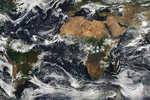
(04/22/2012) Seventeen top scientists and four acclaimed conservation organizations have called for radical action to create a better world for this and future generations. Compiled by 21 past winners of the prestigious Blue Planet Prize, a new paper recommends solutions for some of the world’s most pressing problems including climate change, poverty, and mass extinction. The paper, entitled Environment and Development Challenges: The Imperative to Act, was recently presented at the UN Environment Program governing council meeting in Nairobi, Kenya.
Arctic warms to highest level yet as researchers fear tipping points
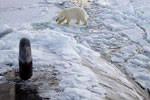
(02/13/2012) Last year the Arctic, which is warming faster than anywhere else on Earth due to global climate change, experienced its warmest twelve months yet. According to recent data by NASA, average Arctic temperatures in 2011 were 2.28 degrees Celsius (4.1 degrees Fahrenheit) above those recorded from 1951-1980. As the Arctic warms, imperiling its biodiversity and indigenous people, researchers are increasingly concerned that the region will hit climatic tipping points that could severely impact the rest of the world. A recent commentary in Nature Climate Change highlighted a number of tipping points that keep scientists awake at night.
Targeting methane, black carbon could buy world a little time on climate change

(01/12/2012) A new study in Science argues that reducing methane and black carbon emissions would bring global health, agriculture, and climate benefits. While such reductions would not replace the need to reduce CO2 emissions, they could have the result of lowering global temperature by 0.5 degrees Celsius (0.9 degree Fahrenheit) by mid-century, as well as having the added benefits of saving lives and boosting agricultural yields. In addition, the authors contend that dealing with black carbon and methane now would be inexpensive and politically feasible.
Food security in developing world threatened by climate change

(06/06/2011) If swift action is not taken to prepare farmers in the developing world for hotter, drier, shorter growing seasons, climate change may threaten the lives of hundreds of millions of people by 2050. People in Africa and South Asia are particularly at risk of further impoverishment and hunger in a warmer world. According to the UN, a billion people are already going hungry worldwide.
(05/23/2011) Last week the 3rd Nobel Laureates Symposium on Global Sustainability concluded with participants—including 17 past Nobel Prize winners and 40 other experts—crafting and signing the Stockholm Memorandum. The document calls for emergency actions to tackle human pressures on the Earth’s environment while ensuring a more equitable and just world.














